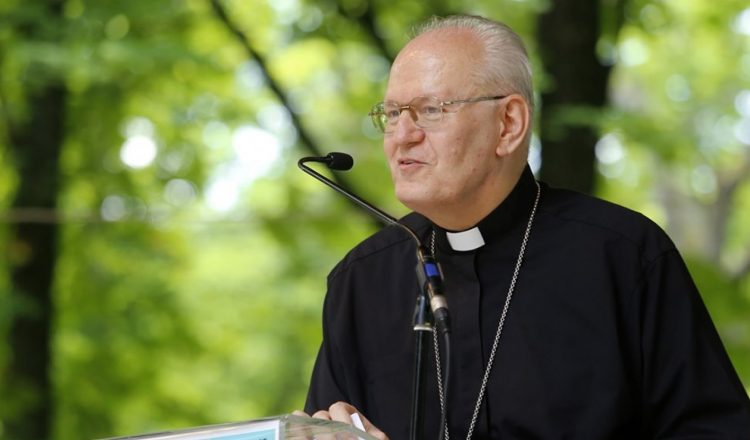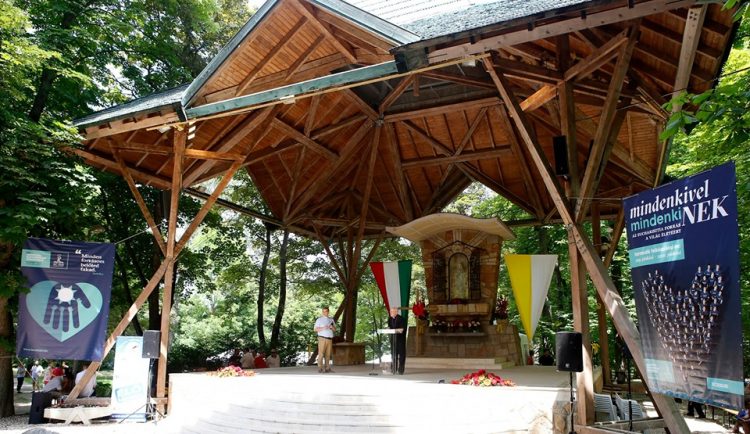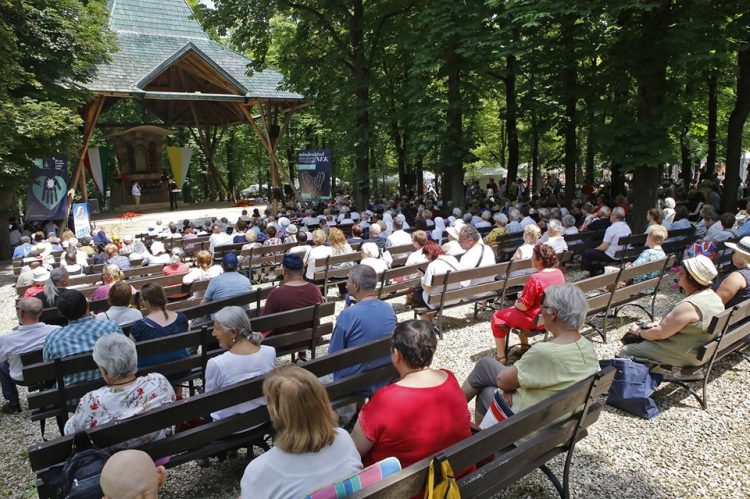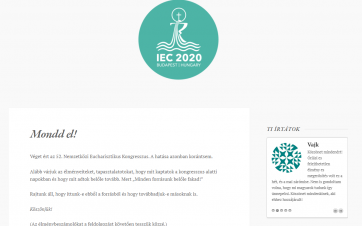
Eucharist: The Spring for the Life of the World

On 10th June, during the picnic of the Archdiocese of Esztergom-Budapest in Máriaremete His Eminence, Péter Card. Erdő has opened the third and last preparatory year for the International Eucharistic Congress (IEC) of 2020, in the centre of which one can find the turning towards the others, the evangelisation and the mission.

The first year of preparation was about the personal conversion, the theme of the second was the connection between the Church and the Eucharist. The subject of the third preparatory year: the mission – said Péter Erdő. “Since it is Christ himself, who sends out his disciples to preach the good news to every nation. The focal point of this Gospel is that Christ has risen and has connected our humanity into the community life of the Holy Trinity. If we belong to Him, we also will partake in the eternal life and eternal happiness. In the baptism we take Christ upon ourselves, and in the Eucharist, he becomes our food, our life” – said Péter Erdő to the thousands of participants of the picnic. He added: it is very widespread that men shall not be converted, everyone shall be happy in their own faith, in their own perceptions. But not all faiths and perceptions are equal. There are truths, half-truths and grave errors also in regards to ideology and faith. In its declaration about religious freedom, the II Vatican Council reasons that that people shall not be forced with external power to accept any ideology or religion, exactly because there is truth in the matter of faith and this truth shall be accepted freely through the human dignity. If there were no truth in faith, there wouldn’t be such value in this matter the free acceptance of which would be worth to defend.

Cardinal Péter Erdő has emphasised that mission always starts with bearing witness, which requires knowing the world around is, establishing connections and also a personal testimony with our lives. But after all these sooner or later we have to reveal from where we draw the strength, what we believe in, whose disciples we are. So “we do not sing the psalms of silence”. Our mission in not mere presence. Our faith is not merely a feeling. That is why the apostles – and in their footsteps all the Christian generations until today – took up the thousands of dangers, even martyrdom. After confessing our faith, we shall invite those, who are interested and open to our faith and to the baptism. It is wrong to think that mission is only needed on far-away continents, or that this can be carried out only by experts. The task of mission was given to the whole Church. There were mass-conversion already in the first centuries, and not only on the day of the first Pentecost. The ancient Christian document from around 230 AD, known as Didascalia has direct instructions how to handle masses during the Liturgy. And this is not the problem of companies of 10-20 people anymore. During the persecutions under Emperor Diocletian a great number of churches were taken from the Christians, many of them destroyed. And this is a situation which we can know from the history of many countries, for example the Soviet Union or Albania – remembered Péter Erdő, adding that the subject of the mission in the beginning, after the age of the Apostles was the local church community, that is the dioceses, as we call them today. This community invited the new members. And this has not changed until today!
The Cardinal racelled that a few weeks ago he was in South Korea. The faithful of the Archdiocese of Seoul are around 1,5 million, that is the Catholics are a minority in a city of 10 million people. Every year they baptise 17 thousand adults, plus there are the baptisms of the children. They baptise much more adults than children. So, the Diocese is a real mission community. The invitation, the preparation and the baptism itself naturally takes place in the parishes, since the parishes are mission organisations by their origin within the Church. This was the goal then they started to build churches far ways from the bishops’ churches back in the 4th century. To call the people to the faith and the baptism, to prepare them and organise the into a Eucharistic community. This remained the basic function of the parishes in the Middle Ages. When King St. Stephen ordered every ten villages to build a church, it was the definitive step of leading the country to the Christian faith. That is why according to Cardinal Péter Erdő it is extremely important that the majority of this year’s pastoral program is about this: the parish as a mission community.
Photo: Marcsi Ambrus
IEC Secretary











